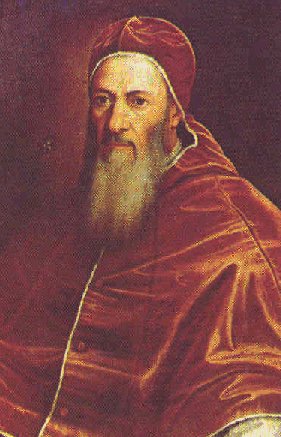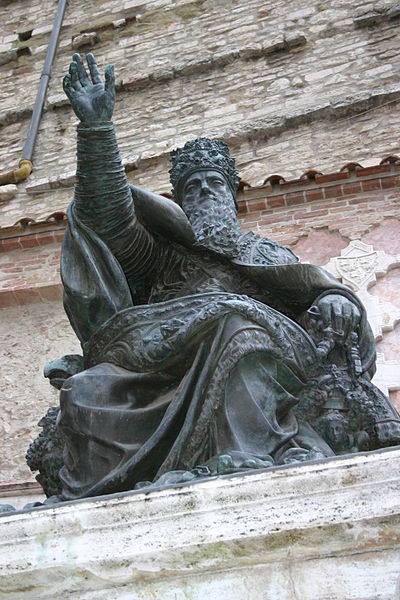<Back to Index>
- Pope Julius III, 1550-1555
PAGE SPONSOR


Pope Julius III (10 September 1487 – 23 March 1555), born Giovanni Maria Ciocchi del Monte, was Pope from 7 February 1550 to 1555.
In
his early career in the Church Julius established a reputation as an
effective and trustworthy diplomat, and was elected to the Papacy as a
compromise candidate when the Papal Conclave found
itself deadlocked between the rival French and German factions. As Pope
he lost, or failed to show, any of the qualities which had
distinguished his previous career, devoting himself instead to a life of
personal pleasure and indolence, and the achievements of his incumbency
were very few. His lasting fame, or notoriety, rests rather on his
relationship with the 17 year old boy whom he raised to the position of
Cardinal - Nephew, and, it was said at the time, with whom he shared his
bed: the resulting scandal did great harm to the reputation of the
Church.
The last of the High Renaissance Popes, Julius III was born Giovanni Maria Ciocchi del Monte in Rome in 1487. His father was a famous jurist; and he himself studied law at Perugia and Siena, as well as theology under the direction of the Dominican, Ambrosius Catharinus.
In 1523 he succeeded his uncle as archbishop of Siponto (Manfredonia) in Apulia, adding the diocese of Pavia in 1520. At the Sack of Rome (1527) he was one of the hostages given by Pope Clement VII to the Emperor's forces, and might have been killed in the Campo de' Fiori as others were, had he not been secretly liberated by Cardinal Pompeo Colonna.
In 1536 he was created cardinal - bishop of Palestrina by Pope Paul III, by whom he was employed on several important legations; he was the first president of the Council of Trent,
opening its first session at Trent, 13 December 1545, with a brief
oration. At the council, he was the leader of the papal party against
Emperor Charles V, with whom he came into conflict on various occasions,
especially when, on 26 March 1547, he transferred the Council to Bologna.
Paul III died on 10 November 1549, and in the ensuing conclave the forty - eight cardinals were divided into three factions: the Imperials, the French, and the adherents of Paul III's grandson, Cardinal Ottavio Farnese. The primary division was between the French and the Imperials (the followers of the Holy Roman Emperor), the Imperials wishing to see the Council of Trent reconvened, the French wishing to see it dropped; a further bone of contention was the Duchy of Parma, for which both the Emperor and the Farnese had claimants.
Neither
the French nor the Germans favored del Monte, and the Emperor had
expressly excluded him from the list of acceptable candidates, but the
French were able to block the other two factions, allowing del Monte to
promote himself as a compromise. He won election on 7 February 1550,
after ten weeks, the longest ever to that date. Ottavio Farnese, whose support had been crucial to the election, was immediately confirmed as Duke of Parma.
At the start of his reign Julius had desired seriously to bring about a reform of the Catholic Church and to reconvene the Council of Trent, but very little was actually achieved during his five years in office. In 1551, at the request of the Emperor Charles V, he consented to the reopening of the council of Trent and entered into a league against the duke of Parma and Henry II of France (1547 – 59), but soon afterwards made terms with his enemies and suspended the meetings of the council (1553).
Discouraged by his dealings with the emperor, Julius increasingly contented himself with interfering in Italian politics alone. He retired to his luxurious palace at the Villa Giulia which he had built for himself close to the Porta del Popolo. From there he passed the time in comfort, emerging from time to time to make timid efforts to reform the Church through the reestablishment of the reform commissions. He was a friend of the Jesuits, to whom he granted a fresh confirmation in 1550; and through the Papal bull, Dum sollicita of August 1552, he founded the Collegium Germanicum, and granted an annual income.
During his pontificate, Catholicism was provisionally restored in England under Queen Mary in 1553. Julius sent Cardinal Reginald Pole as legate with powers that he could use at his discretion to help the restoration succeed. In February 1555 an envoy was dispatched from the English parliament to Julius to inform him of the country's formal submission, but the pope died before the envoy reached Rome.
Shortly before his death, Julius dispatched Cardinal Giovanni Morone to represent the interests of the Church at the Peace of Augsburg.
Julius's particular failures were around his nepotism and favoritism. One notable scandal surrounded his adoptive nephew, Innocenzo Ciocchi Del Monte, a 13 or 14 year old beggar boy whom the future Pope had picked up on the streets of Parma some years earlier. On being elected to the Papacy Julius raised the now 17 year old but still uncouth and quasi - illiterate Innocenzo to the cardinalate, appointed him cardinal - nephew, and showering the boy with benefices - Abbot commendatario of the abbeys of Mont Saint - Michel in Normandy, S. Zeno in Verona, June 1552, later of the abbeys of S. Saba, Miramondo, and of Grottaferrata, Frascati, and other appointments - to the point where his income was one of the highest in Europe. Gossip called the boy Julius's "Ganymede", and the Venetian ambassador reported that Innocenzo shared the pope's bedroom and bed. The relationship became a staple of anti - papal polemics for over a century: it was said that Julius, awaiting Innocenzo's arrival in Rome to receive his cardinal's hat, showed the impatience of a lover awaiting a mistress, and that he boasted of the boy's prowess. The poet Joachim du Bellay, who lived in Rome through this period in the retinue of his relative Cardinal Jean du Bellay, expressed his scandalized opinion of Julius in two sonnets in his series Les regrets (1558).
Despite
the damage which the affair was inflicting on the church, it was not
until after Julius' death in 1555 that anything could be done to curb
Innocenzo's visibility. One outcome of the Innocenzo affair, however,
was the upgrading of the position of Papal Secretary of State,
as the incumbent had to take over the duties Innocenzo was unfit to
perform: the Secretary of State eventually replaced the cardinal - nephew
as the most important official of the Holy See.
Julius spent the bulk of his time, and a great deal of Papal money, on entertainments at the Villa Giulia, created for him by Vignola. Julius extended his patronage to the great Renaissance composer Giovanni Pierluigi da Palestrina, whom he brought to Rome as his maestro di cappella, Giorgio Vasari, who supervised the design of the Villa Giulia, and to Michelangelo, who worked there. But the pope's lack of interest in political or ecclesiastical affairs caused dismay among his contemporaries.